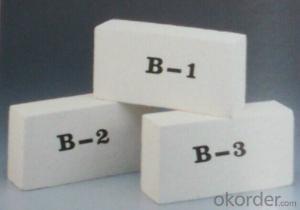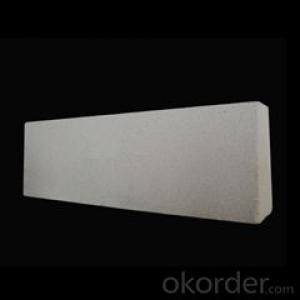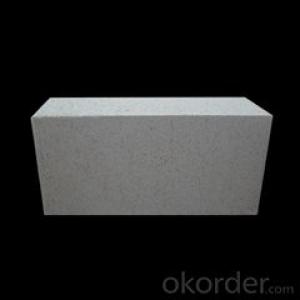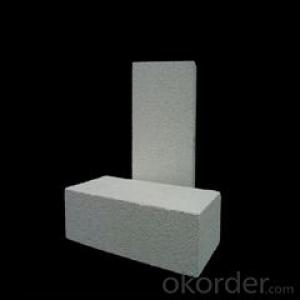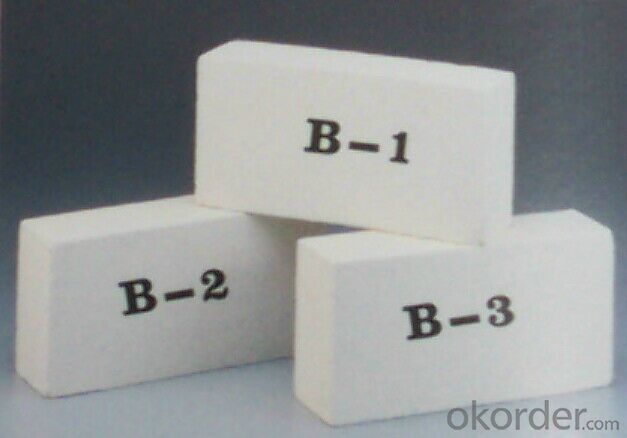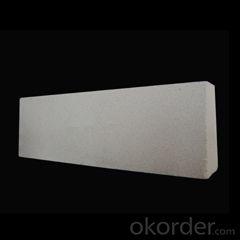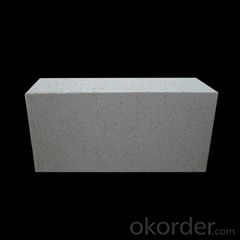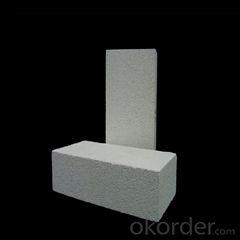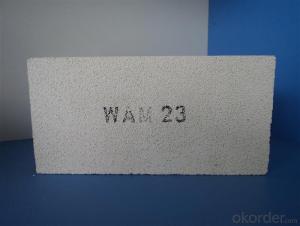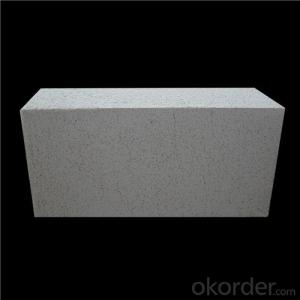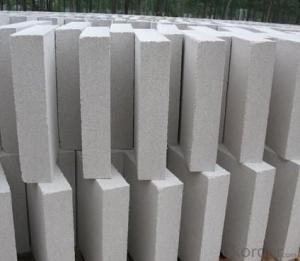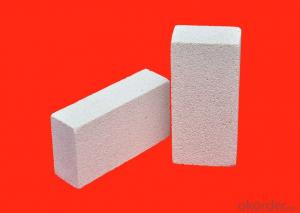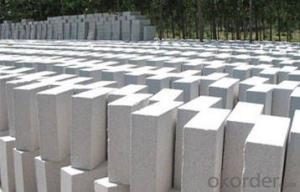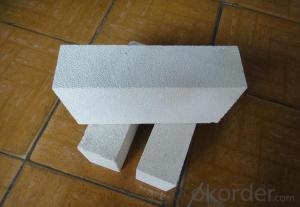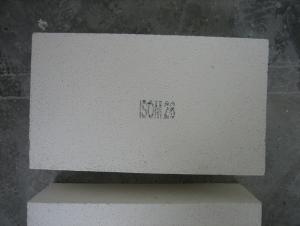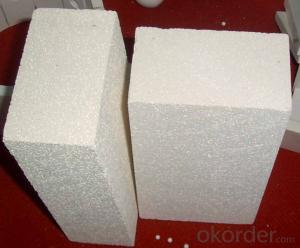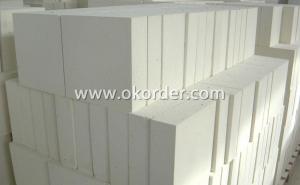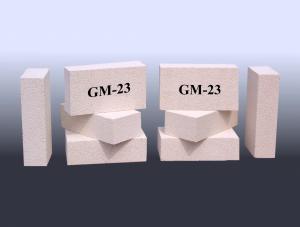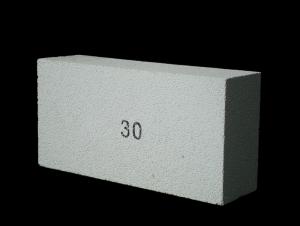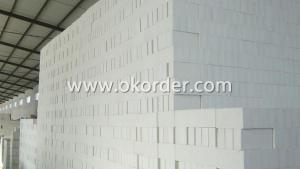Insulating Fire Brick - Refractory Mullite Insulating Refractory Brick JM 96
- Loading Port:
- Shanghai
- Payment Terms:
- TT OR LC
- Min Order Qty:
- 5000 kg
- Supply Capability:
- 10000 kg/month
OKorder Service Pledge
OKorder Financial Service
You Might Also Like
Refractory mullite insulating refractory brick JM 23
Okorder series heat insulation brick
Okorder series thermal insulation brick is an effective, energy saving, low carbon, environmental protection advanced, according to the ASTM standard manufacturing products. Okorder series products are best Li Ning and insulation in all types of industrial furnaces in the metallurgical field, aluminum, petrochemical, electric power and glass ceramic materials. They can be used as part of the working layer of thermal insulation or non - melting. Products have been widely used in the following furnace, achieved satisfactory results.
Application of heat preservation brick
Metallurgical Industry: blast furnace, hot blast furnace, heating furnace, etc..
Petrochemical Industry: ethylene cracking furnace, hydrogen production furnace, primary reformer, heating furnace, etc..
Ceramic industry: roller kiln, kiln, etc..
Glass industry: glass furnace regenerator, etc.
Carbon industry: carbon furnace, etc..
Aluminum electrolysis industry: aluminum reduction cell, etc.
Other industries: tunnel kiln, shuttle kiln, etc..
Advantages of heat insulation brick
Low thermal conductivity: more porosity will bring good thermal insulation effect, energy saving.
High crushing strength: high crushing strength, volume stability.
Low heat storage: small heat storage to absorb more heat, energy-saving effect is obvious.
Gao Chundu: iron, alkali metal impurity content is low.
The precise size: Brick size processing precision, special shape cutting and grinding, accelerate the brickwork.
Insulating brick picture
Common problem solutions
1. What products do you have?
We have all kinds of refractory bricks, refractory casting materials, mortar, cement, ceramic fiber products, etc..
Or you can browse our products to choose what you need.
2. How to control product quality?
With strict quality control system throughout the material selection and production process, we have the quality of refractory materials and ceramic fiber products to meet customer requirements.
From the selection of raw materials, the quality of our control to start. The quality certificate of the raw material is required, each batch of the products are to be tested in the use of the forward line. In the production process, the quality control by the workers, and then each piece of classification, and through the quality supervision and inspection.
3. Can you give me a brief introduction to the application of your product?
My company is mainly engaged in refractories in the steel, cement, glass, ceramics, petrochemical, electric power and other industries.
4. What information do you need if I need you?
In order to select the right products, we will provide us with information, such as the United States, technical data, order quantity, product application, etc..
If you have any questions, please contact us.
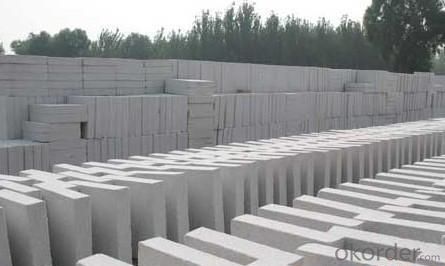
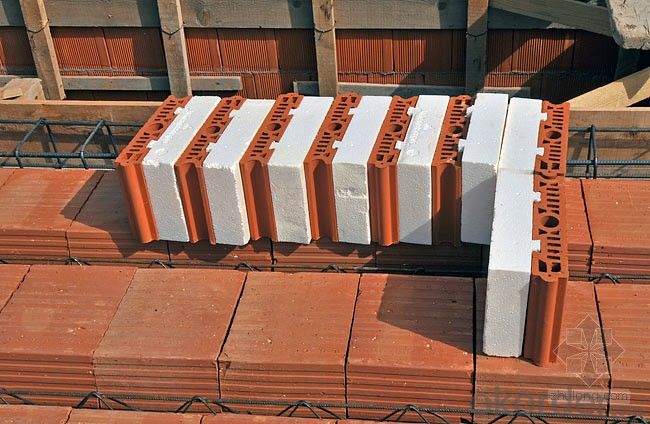
- Q: Are insulating fire bricks suitable for use in cement plants?
- Yes, insulating fire bricks are suitable for use in cement plants. Insulating fire bricks are made from lightweight refractory materials that are designed to resist high temperatures and thermal shock. These bricks have low thermal conductivity, which means they can effectively insulate against heat transfer. In cement plants, where high temperatures are generated during the production process, insulating fire bricks can be used in various applications. They can be used to line the kiln, where the raw materials are heated to extreme temperatures to produce cement clinker. The insulating properties of these bricks help to reduce heat loss and improve energy efficiency in the kiln. Additionally, insulating fire bricks can be used to line the preheater tower and other high-temperature areas in the cement plant. These bricks provide insulation and protection against the intense heat, helping to prolong the lifespan of the equipment and reduce maintenance costs. Furthermore, the lightweight nature of insulating fire bricks makes them easier to handle and install compared to traditional refractory bricks. This can save time and labor during the construction or repair of cement plant equipment. Overall, insulating fire bricks are a suitable choice for use in cement plants due to their high-temperature resistance, low thermal conductivity, and ease of installation. They can contribute to improved energy efficiency, equipment durability, and cost savings in cement plant operations.
- Q: Can insulating fire bricks be used in the construction of hot blast stoves?
- Yes, insulating fire bricks can be used in the construction of hot blast stoves. Insulating fire bricks are designed to withstand high temperatures and provide excellent thermal insulation, making them suitable for use in environments with extreme heat such as hot blast stoves. These bricks help to maintain the high temperatures required for efficient combustion while minimizing heat loss, improving the overall performance and energy efficiency of the hot blast stoves.
- Q: Can insulating fire bricks be used in the construction of lime recovery kilns?
- Insulating fire bricks are indeed applicable for the construction of lime recovery kilns. These kilns, utilized in industrial settings, operate at high temperatures to convert limestone into lime via calcination. Specifically designed to endure elevated temperatures and offer exceptional thermal insulation, insulating fire bricks are composed of lightweight refractory materials, such as clay or silica, and possess low thermal conductivity. Within lime recovery kilns, which can reach temperatures ranging from 900 to 1200 degrees Celsius, insulating fire bricks are suitable for lining the kiln's walls, floors, and roofs. Their superior insulating properties effectively diminish heat loss, thereby enhancing energy efficiency by retaining heat within the kiln. Consequently, this results in reduced fuel consumption and cost savings. Furthermore, insulating fire bricks exhibit excellent resistance to thermal shock, a crucial characteristic in the lime recovery process. These kilns undergo repeated cycles of heating and cooling, necessitating bricks capable of withstanding temperature fluctuations without cracking or disintegrating. Ultimately, insulating fire bricks prove to be a fitting choice for lime recovery kilns due to their capacity to withstand high temperatures, provide thermal insulation, and resist thermal shock.
- Q: Can insulating fire bricks be used in outdoor fire pits?
- Yes, insulating fire bricks can be used in outdoor fire pits. Insulating fire bricks are designed to withstand high temperatures, making them suitable for use in fire pits. They are made from materials that are resistant to heat, such as ceramic fibers or refractory materials, which helps to retain the heat within the fire pit. Additionally, insulating fire bricks are lightweight and easy to install, making them a convenient choice for outdoor fire pits. However, it is important to note that insulating fire bricks may not be as durable as regular fire bricks, so they may require more frequent replacement if exposed to extreme temperatures or harsh weather conditions.
- Q: Are insulating fire bricks resistant to hydrogen sulfide?
- Yes, insulating fire bricks are generally resistant to hydrogen sulfide due to their high melting point and chemical stability.
- Q: Are insulating fire bricks resistant to thermal shock cracking?
- Insulating fire bricks exhibit resistance against thermal shock cracking. These bricks are engineered to endure elevated temperatures and sudden temperature variations without experiencing cracks. With their low thermal conductivity, they efficiently capture and retain heat while remaining unharmed by thermal shock. Consequently, insulating fire bricks find frequent application in contexts where thermal shock poses a potential hazard, such as furnaces, kilns, and other environments with high temperatures. Their dependable resistance to thermal shock cracking renders them a trustworthy selection for such applications.
- Q: Can insulating fire bricks be used in the construction of foundry molds?
- Insulating fire bricks are capable of being utilized in the construction of foundry molds. These bricks are produced using lightweight materials like clay, alumina, and silica, and are specifically designed to possess low thermal conductivity. This quality renders them ideal for various applications that necessitate resistance against high temperatures and insulation, particularly foundry molds. Foundry molds are employed to shape and retain molten metal during the casting procedure. Given that molten metal is generally poured at exceedingly high temperatures, it becomes imperative to employ materials that can endure the heat without melting or distorting. Insulating fire bricks possess a high melting point and exceptional thermal stability, making them appropriate for usage in foundry molds. Furthermore, apart from their resistance to high temperatures, insulating fire bricks also offer commendable insulation properties. This proves to be crucial in foundry molds as it assists in regulating the cooling rate of the molten metal, thereby preventing thermal shock and ensuring proper solidification. The insulation properties of insulating fire bricks also contribute to lowering energy consumption and enhancing the overall efficiency of the foundry process. All in all, insulating fire bricks are an enduring and efficient choice for the construction of foundry molds. They provide resistance against high temperatures, excellent thermal stability, and reliable insulation properties, thus establishing themselves as a dependable option for employment in the demanding conditions of foundry operations.
- Q: What are the insulation materials for heating buried pipelines?
- The heat preservation layer is composed of antirust paint, heat insulating material, moisture-proof layer (used for pipeline in the trench), protective layer, anticorrosive layer (used for trench or directly buried pipe) and top coat (or fireproof coating).The waterproof layer can be used asphalt or aluminum foil protective layer with glass cloth or galvanized steel.
- Q: Can insulating fire bricks be used in glass furnaces?
- Yes, insulating fire bricks can be used in glass furnaces. They are commonly used to line the walls and roofs of glass furnaces to reduce heat loss, improve energy efficiency, and provide thermal insulation.
- Q: What is the average density of insulating fire bricks?
- The average density of insulating fire bricks typically ranges from 0.6 to 1.2 grams per cubic centimeter.
Send your message to us
Insulating Fire Brick - Refractory Mullite Insulating Refractory Brick JM 96
- Loading Port:
- Shanghai
- Payment Terms:
- TT OR LC
- Min Order Qty:
- 5000 kg
- Supply Capability:
- 10000 kg/month
OKorder Service Pledge
OKorder Financial Service
Similar products
Hot products
Hot Searches
Related keywords
